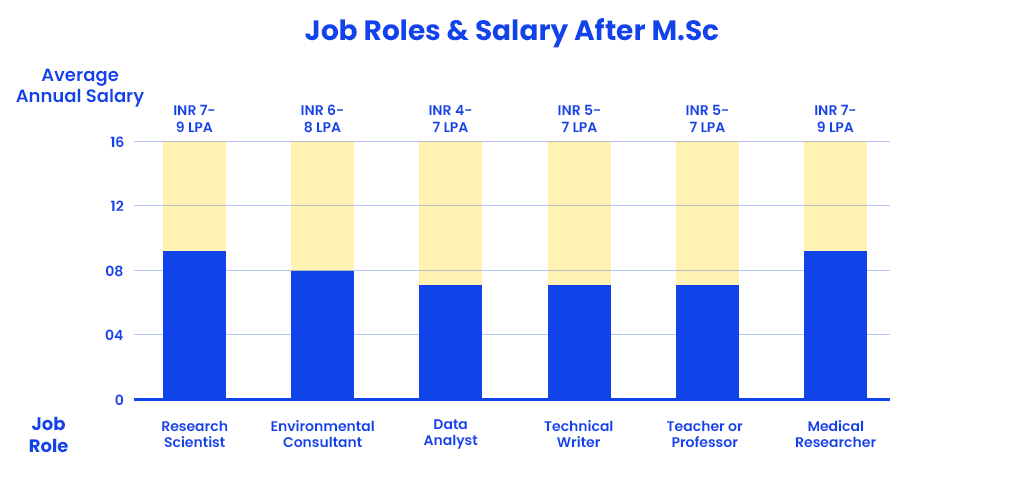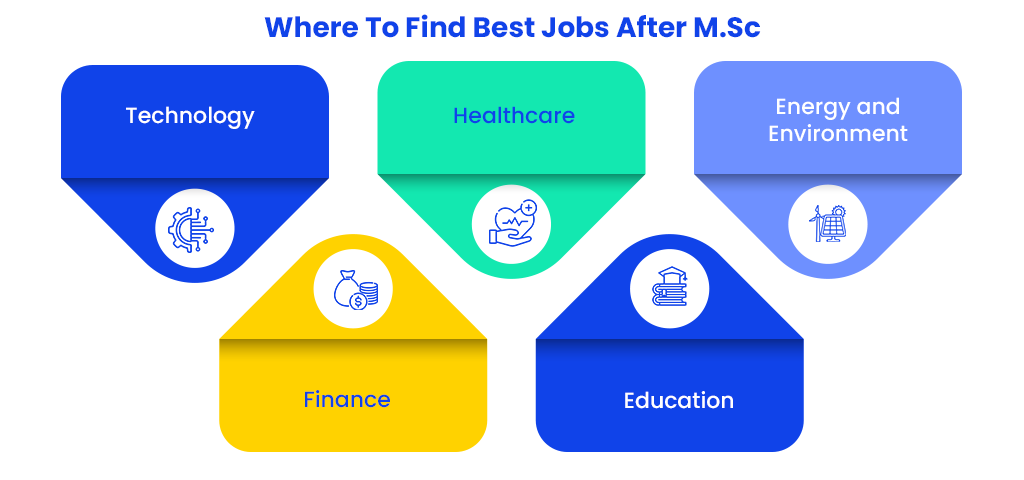Master of Science or M.Sc degree is a postgraduate academic degree typically awarded by universities after the completion of a program of study in a science-related field. A career after obtaining an M.Sc degree can be very rewarding, with many opportunities available in various industries. The specific career opportunities available to you will depend on your area of study and your interests.
M.Sc degrees are offered in a wide range of fields, including biology, chemistry, physics, mathematics, computer science, engineering, and many others. They are highly valued by employers and can lead to a variety of career opportunities in academia, research, industry, and government.
An M.Sc degree is often pursued by students who have completed an undergraduate degree in a related field and wish to deepen their knowledge and expertise in a particular area of science. The specific requirements for an M.Sc degree may vary depending on the university and the program of study, but typically involve coursework, research, and the completion of a thesis or dissertation.
Career Opportunities After M.Sc
The career opportunities available to you after obtaining an M.Sc degree can vary depending on your area of study, experience, and skills. Following are some varied career paths that M.Sc graduates might pursue: 
- Research Scientist- As a research scientist, you would work to advance scientific knowledge in your field of study. This might involve designing and conducting experiments, analysing data, and publishing research papers. Research scientists can work in academia, government, or private industry, and may focus on a range of topics, including health, technology, and environmental issues.
- Engineer- If you choose to pursue a career in engineering, you may work in areas such as civil engineering, mechanical engineering, electrical engineering, or chemical engineering, among others. Engineers design, develop, and maintain systems, structures, and machines to meet specific needs in various industries. For example, a mechanical engineer may design and build machines used in manufacturing, while a civil engineer may design and oversee the construction of buildings, roads, and bridges.
- Data Analyst- As a data analyst, you would use statistical methods and programming languages to analyse large amounts of data and identify patterns and trends. Data analysts work in a variety of industries, including finance, healthcare, marketing, and technology. They help organisations make informed decisions by providing insights based on data.
- Science Writer- Science writers help to communicate scientific research and discoveries to a broader audience. They may work for scientific journals, news outlets, or other organisations, and may write articles, reports, or blog posts. As a science writer, you would need strong communication skills, as well as a deep understanding of scientific concepts and terminology.
- Teaching and Academia- If you enjoy teaching, you may choose to pursue a career in academia. As a university professor or researcher, you would teach courses in your area of expertise, conduct research, and mentor students. This career path typically requires a PhD degree in your field of study, although some teaching positions may be available to M.Sc graduates as well.
- Environmental Consultant- As an environmental consultant, you would work with businesses or government agencies to assess environmental impacts and develop plans to mitigate them. Your job may involve conducting site assessments, preparing reports, and providing guidance on environmental regulations.
- Medical Researcher- As a medical researcher, you would work to advance scientific knowledge in the field of medicine. Your job may involve conducting clinical trials, analysing data, and publishing research papers. Strong analytical and critical thinking skills are essential for this job.
Overall, an M.Sc degree provides graduates with specialised skills and knowledge that can be applied in a variety of career paths. Whether you choose to pursue a career in research, engineering, data analysis, science writing, teaching, or another field, an M.Sc degree can open up many doors and lead to a fulfilling career.
Salary & Job Roles After M.Sc
The job roles available to you as an M.Sc graduate will depend on your area of study, skills, and experience. However, here are some examples of job roles that you may be qualified for with an M.Sc degree along with their average annual salaries. 
|
Job Role |
Average Annual Base Salary |
|
Research Scientist |
INR 7-9 LPA |
|
Environmental Consultant |
INR 6-8 LPA |
|
Data Analyst |
INR 4-7 LPA |
|
Technical Writer |
INR 5-7 LPA |
|
Teacher or Professor |
INR 5-7 LPA |
|
Medical Researcher |
INR 7-9 LPA |
Future Scope For M.Sc Graduates
The future scope for MSC graduates is promising, as there is a growing demand for skilled professionals in a variety of fields. Here are some examples of areas where MSC graduates may have good job prospects in the future:
- Technology: With rapid advancements in technology, there is a growing demand for professionals with specialised skills in areas such as data analytics, artificial intelligence, and cybersecurity. MSC graduates in computer science, mathematics, or statistics may have good job prospects in these areas.
- Healthcare: With an ageing population and a greater focus on healthcare, there is a growing demand for professionals with expertise in areas such as medical research, healthcare administration, and public health. MSC graduates in biology, biotechnology, or healthcare management may have good job prospects in these areas.
- Energy and Environment: With concerns about climate change and the need for sustainable energy sources, there is a growing demand for professionals with expertise in areas such as renewable energy, environmental science, and green technologies. MSC graduates in fields such as physics, chemistry, or environmental science may have good job prospects in these areas.
- Finance: With a growing need for data analysis and risk management in the finance industry, there is a growing demand for professionals with expertise in areas such as statistics, mathematics, and economics. MSC graduates in these fields may have good job prospects in finance-related roles such as financial analysts or risk managers.
- Education: With a growing need for skilled teachers and educators, there is a growing demand for professionals with advanced degrees in fields such as science, mathematics, or education. MSC graduates in these fields may have good job prospects in teaching, research, or curriculum development roles.
Overall, the future scope for MSC graduates is promising, with many opportunities available in a variety of fields. The specific job prospects available to you will depend on your area of study, experience, and skills, as well as the job market in your chosen field.
Alternative to M.Sc
If you are interested in pursuing a career in research or academia, an M.Sc degree is definitely a great fit. However, if you are interested in a career in engineering, technology, or industry, an M.Tech degree may be more appropriate.
M.Tech programs focus more on the practical application of concepts in industry. These programs have a more specialised curriculum, focusing on a specific area of engineering or technology. The applied focus of an M.Tech program may lead to a wider range of career opportunities in engineering, technology, and industry, as employers may prefer candidates with practical experience and skills that can be applied in the workplace.
M.Tech programs are, hence, highly preferred by science graduates because of the great and obvious career opportunities that the course accompanies.
Another great advantage that comes with an M.Tech course is that even the working professionals can pursue this M.Tech course while continuing with their jobs through Work Integrated Learning Programs (WILP) in engineering. These programs are called M.Tech for Working Professionals program.

An M.Tech for Working Professionals program is a flexible program designed specifically keeping in mind the busy work lifestyles of working professionals. The course allows professionals in the field of science and engineering to earn an M.Tech degree without leaving their jobs.
An M.Tech for Working Professionals degree helps engineers to gain deeper domain knowledge and at the same time gain experience with their respective jobs. This helps them grow better and faster in their careers as it gives you an edge over other candidates who either have the degree or work experience, while you have them both.
Eligibility for M.Tech for Working Professionals
M.Tech for Working Professionals is a program that was designed for people with jobs in several fields of engineering. The aim is to help such professionals upskill themselves and find a better career path.
However, not everybody is allowed to pursue this course as it is a technical course for people who already possess foundational knowledge of the subject. Following are the eligibility conditions for admission to an M.Tech for Working Professionals program.
- The applicant must have completed either a B.E. or B.Tech degree in a relevant specialisation to the one they wish to pursue in M.Tech.
- The applicant must have scored at least 50% marks in their UG degree earned from an approved institution.
- Maximum of the universities allow only applicants with at least 2 years of relevant work experiences, however, it is not mandatory for every university.
Benefits of M.Tech for Working Professionals
You already know that an M.Tech for working professionals program gives you the biggest advantage of continuing your job along with pursuing the course. This is to enhance both the theoretical and practical capabilities of the working professionals so that they can perform better in their respective industries for themselves as well as for the employer.
Following are the potential benefits of pursuing an M.Tech degree in today’s times.
- Specialisation: M.Tech programs typically offer specialised coursework and training in a particular area of engineering or technology, allowing you to gain in-depth knowledge and expertise in a specific field. This can make you a valuable asset to employers, as you will have a deep understanding of a particular area of engineering or technology.
- Career Advancement: An M.Tech degree can help you advance your career in engineering and technology, as it can qualify you for higher-level positions with greater responsibilities and higher salaries. Employers may also prefer candidates with M.Tech degrees, as they demonstrate a higher level of knowledge and skill in their field.
- Practical Skills: M.Tech programs often provide practical, hands-on training that can be directly applied in the workplace. This can make you more attractive to employers, as you will have the skills and knowledge necessary to tackle real-world engineering and technology problems.
- Industry Connections: M.Tech programs often have strong ties to industry partners, providing you with opportunities to gain industry experience, network with potential employers, and even secure job offers before graduation.
- Research Opportunities: Some M.Tech programs also offer research opportunities, allowing you to contribute to cutting-edge research in your field. This can be particularly valuable if you are interested in pursuing a career in research or academia.
Popular M.Tech Specialisations for Working Professionals
Given below are the top M.Tech specialisations for working professionals that are a popular choice among young professionals in the several engineering fields.
- Computer Science Engineering
- Civil Engineering
- Civil Structural Engineering
- Civil Highway Engineering
- Civil Construction Engineering
- Electronics & Communication Engineering
- Mechanical Design Engineering
- Mechanical Engineering
- Electrical Power Engineering
- Mechanical Production Engineering
- Environmental Engineering
- Electronics VLSI Engineering
- Electrical Power Engineering
- Electrical Control System Engineering
Career After M.Tech for Working Professionals
A career after completing an M.Tech degree can be very rewarding, as it can open up many opportunities in engineering, technology, and related fields. Graduates with an M.Tech degree are often highly valued by employers, as they possess specialised knowledge and skills that can be applied to real-world engineering and technology challenges.
In addition, M.Tech graduates may be able to command higher salaries and more senior positions than those with a bachelor's or master's degree in engineering or technology. This is particularly true in industries that require specialised expertise, such as aerospace, defence, automotive, and energy.
M.Tech graduates may also have opportunities to work on cutting-edge research projects and collaborate with other engineers and scientists in their field. This can be particularly rewarding for those who are passionate about innovation and technology development.
The specific job opportunities that you will have after completing your M.Tech for working professionals program will depend on your individual skills, interests, and the job market in your chosen field. The following table lists a few examples of the many job roles that are available to M.Tech graduates.
|
Job Role |
Average Salary |
|
Research and Development Engineer |
INR 5-8 LPA |
|
Design Engineer |
INR 4-6 LPA |
|
Manufacturing Engineer |
INR 4-7 LPA |
|
Project Manager |
INR 13-15 LPA |
|
Quality Control Engineer |
INR 5-8 LPA |
|
Technical Consultant |
INR 9-12 LPA |
Summary
Both these postgraduate degrees of M.Sc and M.Tech are valuable ones and open doors to several great career prospects. However, these are two different programs and so the choice between them depends on your career goals and interests. If you are interested in a career in research or academia, an M.Sc degree may be a better fit. But, if you are inclined towards a career in engineering, technology, or industry, then an M.Tech degree is surely more appropriate.
Also, as discussed in the blog, if you are already a working professional in the field of science and engineering, then pursuing an M.Tech for working professionals degree is your fastest way to achieve success.
However, you must be very careful while choosing the right university for yourself as your career depends on it. There are many fake universities that are not approved by the government who promise to get you a degree which turns out to be invalid at last. So, make a wise decision by only selecting an approved university. You can easily get the list of approved universities offering M.Tech for working professionals program at College Vidya. Not only the list, but you also get each and every detail about the university and the course for you to compare and choose accordingly.
















